Unit 5 lesson2 Listening and Speaking课件(新人教版必修第一册)
文档属性
| 名称 | Unit 5 lesson2 Listening and Speaking课件(新人教版必修第一册) | 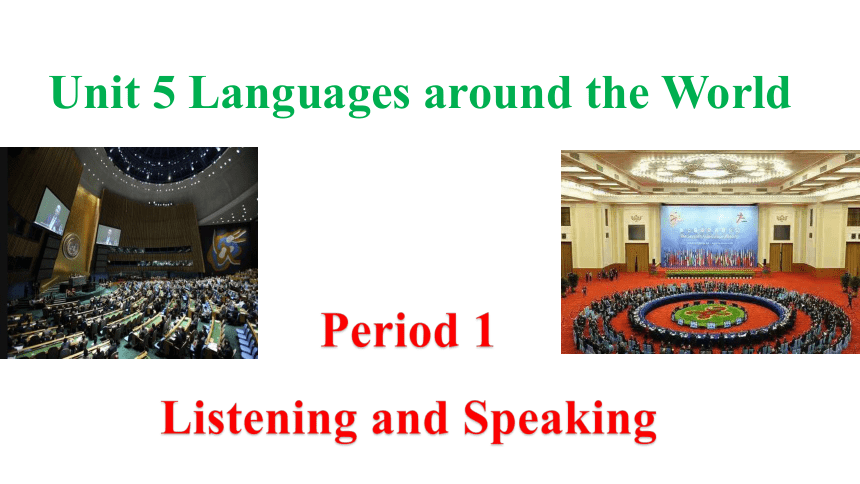 | |
| 格式 | pptx | ||
| 文件大小 | 37.9MB | ||
| 资源类型 | 试卷 | ||
| 版本资源 | 人教版(2019) | ||
| 科目 | 英语 | ||
| 更新时间 | 2023-08-29 00:07:56 | ||
图片预览

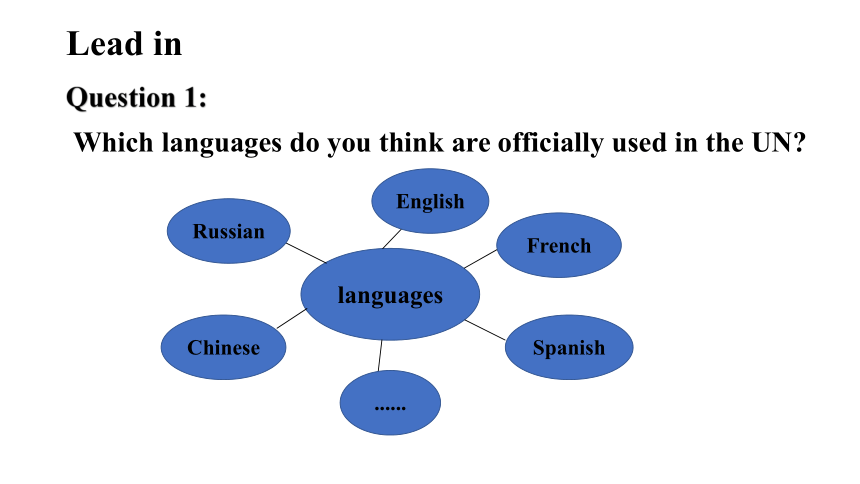
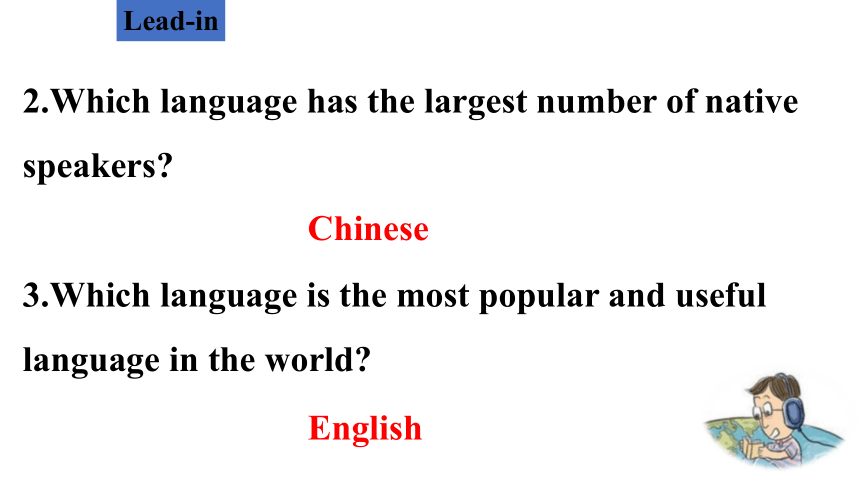
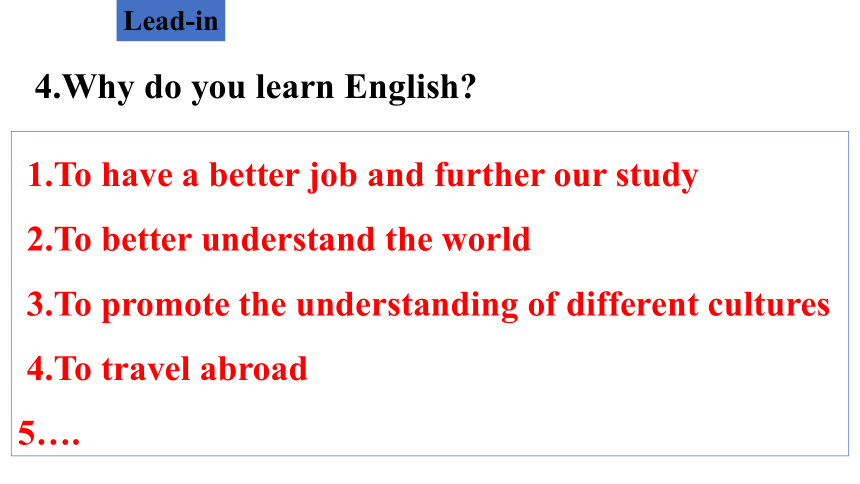

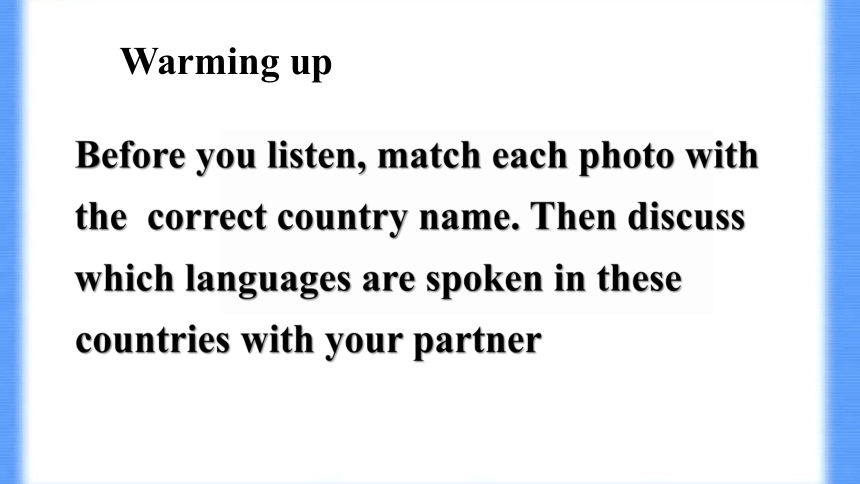

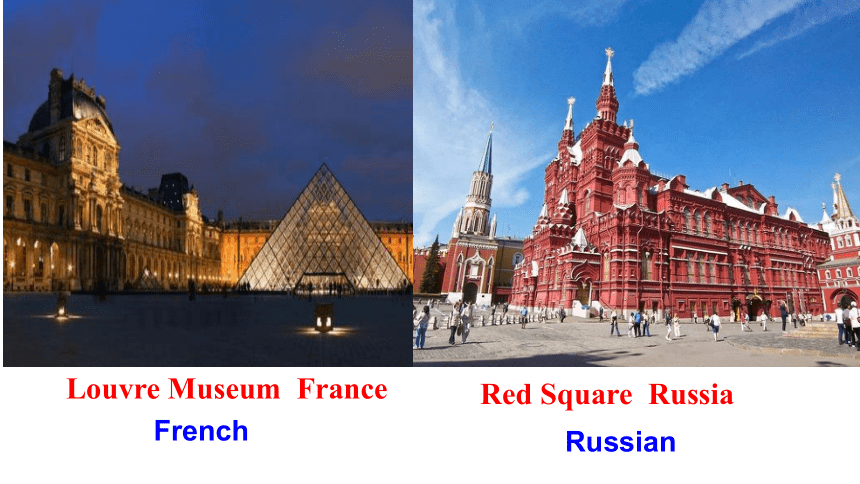
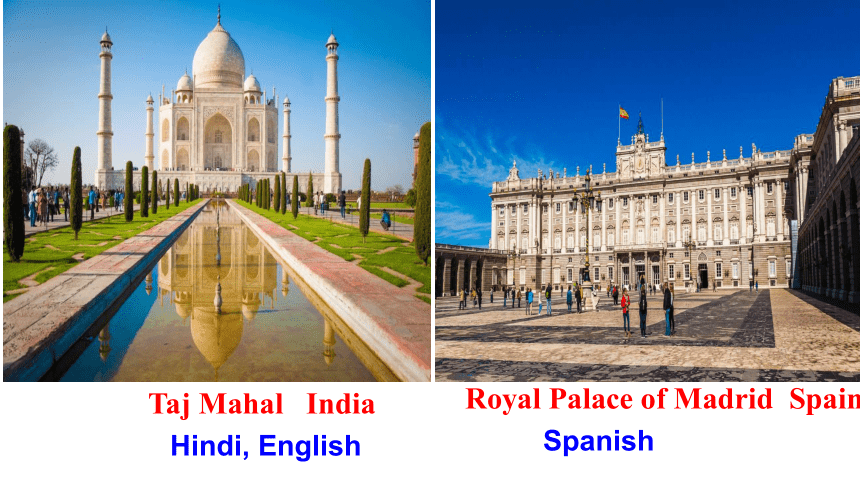
文档简介
(共26张PPT)
Unit 5 Languages around the World
Period 1
Listening and Speaking
Question 1:
Which languages do you think are officially used in the UN
Lead in
languages
Russian
Spanish
French
English
Chinese
......
Lead-in
2.Which language has the largest number of native speakers
3.Which language is the most popular and useful language in the world
Chinese
English
Lead-in
4.Why do you learn English
1.To have a better job and further our study
2.To better understand the world
3.To promote the understanding of different cultures
4.To travel abroad
5….
Why do you need to learn English
The best answer I have ever heard is to create more possibilities in normal life. This could be a chance to go abroad or make foreign friends or even step on a new career and live a totally different life. If you think your life is too boring, why not pick up a language
Before you listen, match each photo with the correct country name. Then discuss which languages are spoken in these countries with your partner
Warming up
CN Tower Canada
English, French
Brandenburg Gate
Germany
German
French
Russian
Louvre Museum France
Red Square Russia
Taj Mahal India
Royal Palace of Madrid Spain
Hindi, English
Spanish
Do you know these countries and their languages
Japan-Japanese
China-Chinese
Egypt-Arabic
Denmark-Danish
Brazil-Portuguese[ p rt u ɡi z]
Italy-Italian
1. Match each photo with the correct country name.
France ____ Russia ____ Germany _____ Spain _____ Canada____ India___
3
4
2
6
1
5
Before-listening
Listen to a speech, circle the official languages of the UN and tick the two languages with the most native speakers.
First listening
Russian Chinese Korean Japanese
Spanish Arabic English French
√
√
3.Listen to the speech again and answer the questions.
1. What is the main topic of this speech
Learning a foreign language.
2. How many languages are there in the world
Nearly 7,000.
3. How many billion people speak the UN’s official languages as their native or second language
Around 2.8 billion.
4. What is the attitude of the speaker towards foreign language learning
It’s very useful to learn one or more foreign languages.
4.Listen to the speech again. What do the italicized words refer to in the sentences
Tip: Reference
Pronouns(it,they,she,etc)refer to something or somebody mentioned earlier.Pay attention to the context of words to help you understand what the pronouns refer to.
1 They think it means better job chances in the future.
2 They are spoken by around 2.8 billion people ...
They: students who choose to study a UN language
it: studying a UN language
They: the six UN official languages
To some students, it seems that the only foreign language to learn is English. There are, however, nearly 7,000 languages in the world. After Chinese, the language with the most native language speakers isn't English,it's Spanish! Learning English is very useful, but it is wise to learn at least one other foreign language, if possible.
There are many reasons why people learn a foreign language. Many students choose to study one of the languages that are spoken at the UN. As they think it means better job chances in the future. The UN has six official languages: Arabic, Chinese, English, French, Russian, and Spanish. They are spoken by around 2.8 billion people as their native or second languages.
Listen and repeat
Some students, though, choose to study a language because of family or friends. One American girl chose to learn Danish because her grandparents were from Denmark. When she was little, her grandpa used to read letters to her in Danish from their relatives in Denmark. Another young lady started learning French because she had several friends from African countries where French is spoken.
What do you think Which other language would you choose to study and why
Speaking
If you have the chance, what other language(s) do you want to learn Why
Let’s first read some students’ choices.
My father is doing business with Russians. I’d like to learn Russian so I can help him in the future.
I like watching Japanese cartoons, so I’d like to learn Japanese.
Perhaps I should study French. I think it sounds beautiful, and I know it’s used in many countries.
Discussing: Which foreign language would you like to choose Why
Sample dialogue
A: What language do you want to study
B: I really want to study...I think ...
A: Why ...
B: Yes, I'd love to. Also, ...
A:Oh, I remember that. But I don't know.....
EXAMPLE:A: What language do you want to study B: I want to study... I think.../Because...
Group members Languages Reasons
1.Work in pairs. Read the words to each other and see if you pronounce them differently.
Pronunciation
2. Listen and pay attention to how the speakers pronounce them.
3.Listen to the paragraph read by two different speakers.Which speaker has a British accent and which has an American accent
Pronunciation
English is a crazy language. There is no egg in eggplant nor ham in hamburger; neither apple nor pine in pineapple. English muffins weren't invented in England or French fries in France. Sweetmeats are candies while sweetbreads, which aren't sweet, are meat. ...We find that quicksand can work slowly, boxing rings are square, and a guinea pig is neither from Guinea nor is it a pig. And why is it that writers write but... hammers don't harm (Richard Lederer)
1. Tell one of your friends what language you would love to learn in the future and why.
2. Review the new words learnt from the listening material; billion, native, attitude...
Thank you
Unit 5 Languages around the World
Period 1
Listening and Speaking
Question 1:
Which languages do you think are officially used in the UN
Lead in
languages
Russian
Spanish
French
English
Chinese
......
Lead-in
2.Which language has the largest number of native speakers
3.Which language is the most popular and useful language in the world
Chinese
English
Lead-in
4.Why do you learn English
1.To have a better job and further our study
2.To better understand the world
3.To promote the understanding of different cultures
4.To travel abroad
5….
Why do you need to learn English
The best answer I have ever heard is to create more possibilities in normal life. This could be a chance to go abroad or make foreign friends or even step on a new career and live a totally different life. If you think your life is too boring, why not pick up a language
Before you listen, match each photo with the correct country name. Then discuss which languages are spoken in these countries with your partner
Warming up
CN Tower Canada
English, French
Brandenburg Gate
Germany
German
French
Russian
Louvre Museum France
Red Square Russia
Taj Mahal India
Royal Palace of Madrid Spain
Hindi, English
Spanish
Do you know these countries and their languages
Japan-Japanese
China-Chinese
Egypt-Arabic
Denmark-Danish
Brazil-Portuguese[ p rt u ɡi z]
Italy-Italian
1. Match each photo with the correct country name.
France ____ Russia ____ Germany _____ Spain _____ Canada____ India___
3
4
2
6
1
5
Before-listening
Listen to a speech, circle the official languages of the UN and tick the two languages with the most native speakers.
First listening
Russian Chinese Korean Japanese
Spanish Arabic English French
√
√
3.Listen to the speech again and answer the questions.
1. What is the main topic of this speech
Learning a foreign language.
2. How many languages are there in the world
Nearly 7,000.
3. How many billion people speak the UN’s official languages as their native or second language
Around 2.8 billion.
4. What is the attitude of the speaker towards foreign language learning
It’s very useful to learn one or more foreign languages.
4.Listen to the speech again. What do the italicized words refer to in the sentences
Tip: Reference
Pronouns(it,they,she,etc)refer to something or somebody mentioned earlier.Pay attention to the context of words to help you understand what the pronouns refer to.
1 They think it means better job chances in the future.
2 They are spoken by around 2.8 billion people ...
They: students who choose to study a UN language
it: studying a UN language
They: the six UN official languages
To some students, it seems that the only foreign language to learn is English. There are, however, nearly 7,000 languages in the world. After Chinese, the language with the most native language speakers isn't English,it's Spanish! Learning English is very useful, but it is wise to learn at least one other foreign language, if possible.
There are many reasons why people learn a foreign language. Many students choose to study one of the languages that are spoken at the UN. As they think it means better job chances in the future. The UN has six official languages: Arabic, Chinese, English, French, Russian, and Spanish. They are spoken by around 2.8 billion people as their native or second languages.
Listen and repeat
Some students, though, choose to study a language because of family or friends. One American girl chose to learn Danish because her grandparents were from Denmark. When she was little, her grandpa used to read letters to her in Danish from their relatives in Denmark. Another young lady started learning French because she had several friends from African countries where French is spoken.
What do you think Which other language would you choose to study and why
Speaking
If you have the chance, what other language(s) do you want to learn Why
Let’s first read some students’ choices.
My father is doing business with Russians. I’d like to learn Russian so I can help him in the future.
I like watching Japanese cartoons, so I’d like to learn Japanese.
Perhaps I should study French. I think it sounds beautiful, and I know it’s used in many countries.
Discussing: Which foreign language would you like to choose Why
Sample dialogue
A: What language do you want to study
B: I really want to study...I think ...
A: Why ...
B: Yes, I'd love to. Also, ...
A:Oh, I remember that. But I don't know.....
EXAMPLE:A: What language do you want to study B: I want to study... I think.../Because...
Group members Languages Reasons
1.Work in pairs. Read the words to each other and see if you pronounce them differently.
Pronunciation
2. Listen and pay attention to how the speakers pronounce them.
3.Listen to the paragraph read by two different speakers.Which speaker has a British accent and which has an American accent
Pronunciation
English is a crazy language. There is no egg in eggplant nor ham in hamburger; neither apple nor pine in pineapple. English muffins weren't invented in England or French fries in France. Sweetmeats are candies while sweetbreads, which aren't sweet, are meat. ...We find that quicksand can work slowly, boxing rings are square, and a guinea pig is neither from Guinea nor is it a pig. And why is it that writers write but... hammers don't harm (Richard Lederer)
1. Tell one of your friends what language you would love to learn in the future and why.
2. Review the new words learnt from the listening material; billion, native, attitude...
Thank you
